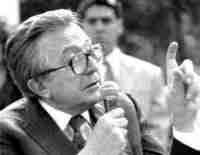 SKC Films Library SKC Films Library |
|
|
| SKC Films Library >> General and Old World History >> Italy >> Italian Republic, 1948 - Present |
 Giulio
Andreotti Giulio
Andreottipolitician Giulio Andreotti was born in Rome on January 14, 1919. His father died when he was quite young, and he was raised by his mother and two older siblings. Despite the family being financially strapped, he was able to attend the University of Rome, from which he received his law degree in 1942. He subsequently served as president of the FUCI, the student branch of Catholic Action, from 1942 to 1945, and was also an editor of the Catholic Azione Fucina, a weekly university magazine. After Italy was liberated from Fascist control in 1944, Andreotti became a member of the national council of Democrazia Cristiana (Christian Democratic Party), which had previously been an underground organization. In 1946, he was elected to the Constituent Assembly charged with drafting the constitution of the new Italian Republic. Subsequently elected to the Chamber of Deputies, he served in that body until 1991, when President Francesco Cossiga appointed him Senator for Life. In addition to his career in the Assembly, Andreotti has served in more than 30 individual ministerial or prime ministerial positions, as partially listed below: 1947-1953 -- Deputy Minister in the
government of Alcide De Gasperi Throughout his career Andreotti was known for his ability to engineer compromises when the situation may have otherwise been hopeless, as well as for being able to successfully ward off political advances by the Italian Communist Party. He was also known for being very accessible to his constituency, always willing to meet and talk with voters. Immensely popular, he most likely holds the record for most votes ever received by a single Italian politician over the course of his career. Unfortunately, Andreotti's political career took a serious hit in April 1993, when he and his Christian Democratic Party were publicly accused of having ties to the mafia. The subsequent investigations led to the party's decline, and by 1994 the party had completely disappeared from the political arena. In September 1995, Andreotti went on trial for having ties to the mafia, but was eventually acquitted. After appealing the acquittal, the state retried Andreotti on the original charges, as well as on charges of ordering the 1979 murder of Mino Pecorelli, a journalist who had published the initial allegations of mafia ties. Convicted in November 2002, he was sentenced to 24 years in prison, but was immediately released pending appeal. On October 30, 2003, an appeals court overturned Andreotti's conviction and acquitted him of the murder charge. Later that same year, another court acquitted him of having mafia ties, but only because it determined that the statute of limitations had expired. Andreotti lived in relative retirement from public life until April 2006, when he agreed to be the House of Freedoms candidate for the presidency of the Senate. He lost the election to The Union's Franco Marini, by a vote of 165 to 156. He subsequently occupied his time by writing articles and making occasional television appearances, and died in Rome on May 6, 2013. Andreotti was also the author of several mystery novels, cultured biographies, and political commentaries, including: De Gasperi e il suo tempo (1965), a biography of Alcide De Gasperi; and a three-volume set of recollections and observations about the many world leaders he met during his career, Visit da Vicino (1982), Visti da Vicino-Seconda Serie (1983), and Visit da Vicino-Terza Serie (1985). WEB SOURCE |
| SKC Films Library >> General and Old
World History >> Italy >> Italian Republic, 1948 - Present This page was last updated on May 04, 2017. |